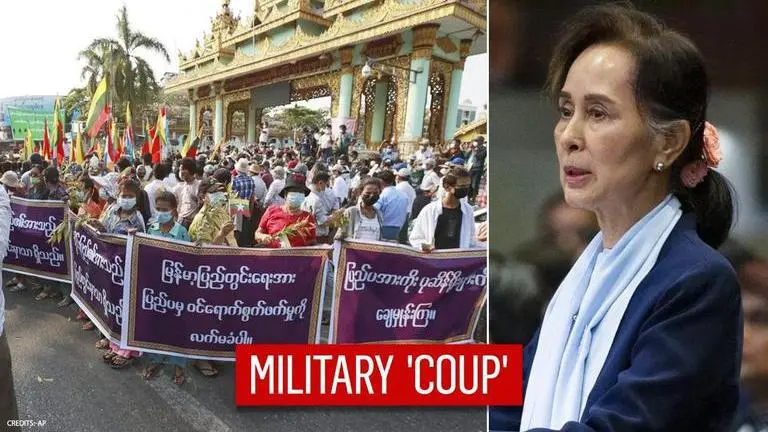Updated 1 February 2021 at 14:16 IST
Aung San Suu Kyi: From Nobel Laureate to being under house arrest, what led to her fall?
Myanmar’s military has detained leader Aung San Suu Kyi and other senior government officials in a series of early morning raids on February 1.
- World News
- 5 min read

Myanmar's military has taken power and declared a state of emergency on February 1 in a coup democratically elected government. The military has detained leader Aung San Suu Kyi and other senior government officials in a series of early morning raids. Nobel laureate Suu Kyi has been placed under house arrest along with other leaders of her party, National League for Democracy (NLD). A presenter on military-owned Myuawaddy TV had announced the takeover on Monday while citing a section of the military-drafted constitution that allows the armed forces to take control at the time of national emergency.
Budding from the military’s claims of voter fraud in November 2020’s election, the presenter also said that the reason for the military seizing the leaders was their inability to act on the same. The unprecedented turn of events in Myanmar has handed the power over to military chief Min Aung Hlaing and imposed a state of emergency for a year. However, it marked a shocking fall from power for State Counsellor of Myanmar, Aung San Suu Kyi who led the democracy struggle despite years under house arrest and even won the 1991 Nobel Peace Prize for her efforts.
From the rise to the fall of Aung San Suu Kyi
Aung San Suu Kyi’s father, Gen. Aung San is revered as Myanmar’s founder after it gained independence from the British in 1948. She is also described as an “outstanding example of the power of the powerless” and in 2015, her party NLD won the general election by a landslide and Suu Kyi took over a specially created role of State Counsellor. Even though she worked on Myanmar’s ethnic conflicts, at least six Nobel laureates have called for Suu Kyi to ‘condemn’ the treatment of Rohingyas in the Southeast Asian nation.
In November 2017, she was even stripped of the Freedom of the City of Oxford award. It was given to her in 1997 for "her opposition to oppression and military rule in Burma". "Oxford has a long tradition of being a diverse and humane city, and our reputation is tarnished by honouring those who turn a blind eye to violence."
Advertisement
Advertisement
Who is Suu Kyi?
Suu Kyi, the youngest daughter of Aung San and Khin Kyi, was born in Rangoon, British Burma on June 19, 1945. Following her graduation from the University of Delhi in 1964 and the University of Oxford in 1968, the worked at the United Nations (UN) for at least three years. Subsequently, her role magnified in the 1988 uprising which made her the national icon in Burma where the country was undergoing civil unrest and demonstrations by the military government at the time. Suu Kyi then became the General Secretary of the National League for Democracy (NLD) which she had formed along with other military officials.
When did she become a global icon?
Even though in 1990, NLD won the general elections, the military had refused to hand over the power and Suu Kyi was reportedly placed under house arrest. She remained detained for nearly 15 years out of 21 from 1989 to 2010. It was during this period that she gained international recognition for backing the movement of democracy in Myanmar with her non-violent protest. In 1999, the Time Magazine had also termed her as one of the ‘Children of Gandhi’.
What led her fall?
However, soon after the 2015 general election after being in house arrest for so long and becoming an icon for the world, her reported fall started in 2016 with the emergence of Myanmar’s Rohingya crisis. The unrest led to an attack on three police border posts in Rakhine State and killed nine officers. Southeast Asian nation’s then military even carried out a security operation that led to 70,0000 people leaving the area of neighbouring Bangladesh. Suu Kyi was reportedly accused of failing to use her ‘moral authority’ to protect the civilians.
"These are mass killings and they're taking place right now and Aung San Suu Kyi's office is not only doing nothing to stop it -- in some ways they're throwing fuel on the fire," said Matthew Smith, founder of human rights groups Fortify Rights.
What's happening in Myanmar now?
Irrespective of global backlash, she remained popular in her home country leading to general elections in 2020 in which, Army chief Min Aung Hlaing claimed that civilian government was making "unacceptable mistakes" in the run-up to the election. Suu Kyi had even reacted to the crisis and urged the people to not be intimidated and NLD emerged victoriously. However, the military alleged that the elections were full of ‘irregularities’ and questioned the veracity of at least 9 million votes cast in November 2020 even though the country’s election commission rejected the claims of fraud. Myanmar military stressed that it will protect and abide by its constitution. The UN, US, India among other nations have raised 'alarm' over the situation.
Published By : Aanchal Nigam
Published On: 1 February 2021 at 14:16 IST
